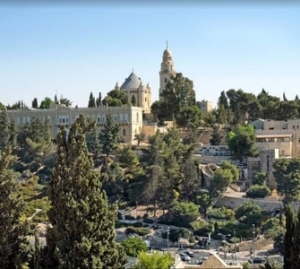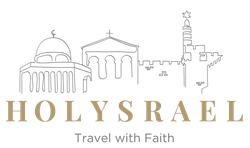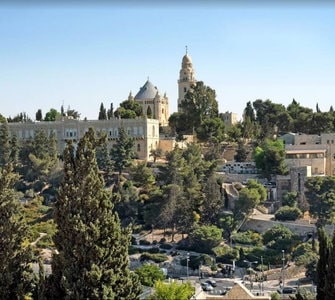Mount Zion
Mount Zion in Jerusalem
 Mount Zion is one of the hills in the western part of Jerusalem. Over the centuries, Mount Zion has been included in the city of Jerusalem now known as the “Old city”.
Mount Zion is one of the hills in the western part of Jerusalem. Over the centuries, Mount Zion has been included in the city of Jerusalem now known as the “Old city”.
This hill was included in the city of Jerusalem in particular at the time of King Herod and later at the time of the Great Revolt under King Agrippas 1st and then at the time of the Byzantines under the Empress Eudocie. Now, Mount Zion is situated outside the “old city” walls, which is outside Jerusalem of the time of Ottomans.
The importance of Mount Zion for the 3 religions
Mount Zion is one of the main places in Jerusalem: here the three religions are again linked at one point. Mount Zion has been recognised as the site of the tomb of King David or Daoud in Arabic, a crucial person for Jews and an important prophet for Muslims.
Also, just above King David's tomb is the room where Jesus has the Last Supper. This “coincidence” of both places one over the other is significant because according to Christian theology, King David is Jesus Christ's ancestor. In the Byzantine period, Mount Zion was the most visited holy site after the Holy Sepulchre.
Remarkable sites to visit on Mount Zion
There are several places on Mount Zion that you absolutely must visit! Among these there is, of course, King David's Tomb with the small synagogue from the 1st century, (which was most likely a place of prayer for the proto-Nazareans).
There is also the Last Supper Room , the viewing point towards the Mount of Olives with the little room where Yitshak Ben Tsvi came to reflect on the situation of his Jewish citizens, St. Peter's Church in Gallicante, the Dormition Church ( where Mary, the mother of Jesus “reposed” and then ascended to Heaven), Oskar Schindler's tomb and the first Holocaust museum in Israel.
Access to this holy site in Jerusalem
It is easy and also free of charge to access Mount Zion or Har Tsion in Hebrew. You can go there by car or on foot leaving the old city through the Sion Gate or along the promenade outside the city walls from the Jaffa Gate to the Sion Gate. The churches and meeting places are generally open all day.
If you're going in an organised group, it's advisable to contact the churches and the Last Supper Room directly.

